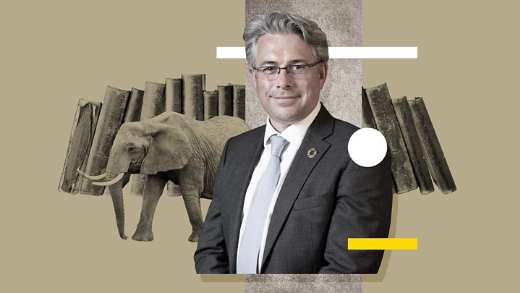Investing in the natural capital transition
We believe that the risks and opportunities associated with the consequences of natural capital erosion and the necessary measures to reduce biodiversity loss, regenerate the planet and transform the economy into one that is nature positive are becoming increasingly important.
We believe markets will increasingly price in the costs and opportunities of addressing natural capital depletion. The World Economic Forum estimates the transition to a nature-positive economy, with critical shifts in land, oceans, infrastructure and energy, could deliver an estimated $10 trillion of business opportunities and 395 million jobs by 2030.2
Our Natural Capital Global Equity Fund fund targets opportunities aligned to the principles of the United Nations’ Sustainable Development Goals (see below specific SDGs) that support and benefit from the transition to a nature-positive economy. We invest with an active, high-conviction approach to address the needs of investors seeking two objectives:
Long-term capital growth
To support the transition to a nature-positive economy
Investment opportunities in the strategy are linked to the following investment themes and aligned with the principles of the following United Nations Sustainable Development Goals:
Circular economy
Climate action
Sustainable ocean
Sustainable land
Our approach
We focus on pairing natural capital credentials of companies alongside shareholder return, and go beyond a simple approach of only investing in companies providing solutions to reduce human impact on nature, to instead also invest in companies transitioning their business models towards a nature-positive economy. Moreover, we seek to drive further positive change by engaging with investee companies on specific biodiversity issues.
Natural Capital credentials alongside shareholder return
In our stock selection process we place significant emphasis on any company having to demonstrate both natural capital credentials and shareholder return as we aim to deliver profitable growth for our clients from exposure to the natural capital theme.
Operational leaders
Our proprietary transition risk model helps identify companies leading in aligning their business models to a nature positive economy across all sectors. Our approach aims to deliver more resilient performance over the long term, uncover more alpha opportunities, and more effectively support the natural capital transition than by investing in solutions-focused companies alone.
Bespoke engagement
We engage with all portfolio companies on specific natural capital issues. Our three-year structured engagement programme systematically tracks all companies with an escalation pathway that could ultimately lead to divestment if we are not satisfied with their progress.
Natural Capital Global Equity Fund
Aviva Investors Natural Capital Global Equity Fund (SICAV)
This fund aims to deliver long-term capital growth by investing in companies globally that either provide solutions to reduce biodiversity loss or are transitioning their business models to manage their impact on nature, while avoiding those that do not meet minimum environmental criteria.

Aviva Investors Natural Capital Global Equity: Strategy in brief
An equity fund that invests globally in companies that are either enabling or transitioning toward a nature-positive economy.
Evidencing how we are progressing against our sustainable outcomes objective
This report looks at the progress the fund has made in 2023, in delivering tangible sustainable outcomes for clients, across the companies invested in as well as through company engagement and macro stewardship.

Key risks
Full information on the risks applicable to the Fund is detailed in the KIID and Prospectus.
Investment risk and currency risk
The value of an investment and any income from it can go down as well as up and can fluctuate in response to changes in currency and exchange rates. Investors may not get back the original amount invested.
Equities risk
Equities can lose value rapidly, can remain at low prices indefinitely, and generally involve higher risks — especially market risk — than bonds or money market instruments. Bankruptcy or other financial restructuring can cause the issuer's equities to lose most or all of their value.
Counterparty risk
The fund could lose money if an entity with which it does business becomes unwilling or is unable to meet its obligations to the Fund.
Illiquid securities risk
Certain assets held in the fund could, by nature, be hard to value or to sell at a desired time or at a price considered to be fair (especially in large quantities), and as a result their prices could be very volatile.
Derivatives risk
Derivatives are instruments that can be complex and highly volatile, have some degree of unpredictability (especially in unusual market conditions), and can create losses significantly greater than the cost of the derivative itself.
Sustainability risk
The level of sustainability risk to which the fund is exposed, and therefore the value of its investments, may fluctuate depending on the investment opportunities identified by the investment manager.
Natural Capital Global Equity portfolio managers

Jonathan Toub
Portfolio Manager, Global Equities
Need more information?
For further information, please contact our investment sales team.
Our views
-

Boosting low-carbon investment in the UK: 2025 Roadmap Update
11 Dec 2025
In 2024, we outlined our view on the most important public-policy interventions to unlock private investment in the low-carbon economy. In this update, we take stock of policy developments since, and look ahead to 2026 and beyond.
-

Navigating nature: Opportunities for the investor of tomorrow
10 Dec 2025
Our society, economies and financial systems are embedded in nature, not external to it. This paper sets out the actions we are taking to understand nature-related risks and opportunities to deliver outcomes that meet our clients’ needs, and to support nature-related global goals.
-

Decarbonising agriculture: Unlocking investment in sustainable land use
17 Jun 2025
Agriculture is integral to reaching net-zero emissions and reversing nature loss. Its transition also presents huge investment opportunities. We held a roundtable of experts to discuss challenges and solutions.
-

Climate Stewardship 2030 programme
29 Apr 2025
Designed to support our holistic stewardship approach, Aviva Investors adopted its Climate Stewardship 2030 programme (CS30) in 2024.
-

Decarbonising buildings: Five barriers and how to overcome them
28 Jan 2025
The built environment generates almost two-fifths of global emissions, but decarbonising the sector will require a coordinated effort. We brought together experts across the value chain to discuss shared challenges and solutions.
-

Can credit hold firm in 2025? The outlook for investment grade credit and climate transition
24 Jan 2025
Credit spreads remained largely immune to turbulence in 2024 despite concerns for a reacceleration in inflation, an unprecedented scale of global elections and volatility on economic data and changing rate cut expectations. Where to in 2025?
-

Decarbonising transport: Five key challenges and how to overcome them
26 Nov 2024
Creating sustainable transport solutions is vital to meet net-zero pledges, but progress has been patchy. To encourage mobilisation across value chains, we brought together a range of sector experts to identify key blockers and potential solutions.
-

Building bridges to net zero: Mobilising value chains for decarbonisation
25 Nov 2024
From aviation to heavy industry, achieving net zero requires a collective unlocking of entire ecosystems. This is what our sector roundtables aim to do, by bringing together stakeholders from across the value chain of high-impact sectors.
-

The tipping point for climate finance: Making financial flows consistent with the Paris Agreement
29 Nov 2023
Transition plans, including from governments in response to the Global Stocktake, will be crucial to bring about the shift to a low-emissions, climate-resilient world. Markets need clear implementation signals to align capital with the goals of the Paris Agreement. Our in-depth report calls for the creation of a transition-plan ecosystem connecting all levels of the global economy.
-

Deals delayed and crowded trades…But investors can still find value in infrastructure debt
4 Sep 2023
Private infrastructure debt still offers a broad spectrum of opportunities, but investors face complex challenges. In this Q&A, our infrastructure debt team contemplate the current state of the market and where it goes from here.
-

Tipping points and transformation: Getting on the right side of change
16 Aug 2023
Rapid changes in the global economy could tip some sectors into low-carbon phases faster than incumbents expect, with important investment implications.
-

Charging up: Batteries and the fight against climate change
5 Jan 2023
Batteries are set to play a crucial role in helping to decarbonise the global transport and energy sectors. As capital floods into an industry experiencing exponential growth, we look at the key considerations for investors.
-

Confronting a permacrisis? The intersection between antimicrobial resistance, climate change and biodiversity loss
23 Nov 2022
Will a warmer and less biodiverse world give pathogens new opportunities, and do we have the tools to confront disease? This report discusses the complex intersection of three planetary crises and calls for urgent action to slow resistance to antimicrobial drugs – an obvious public health emergency.
-

The levers of change: A systems approach to reconcile finance with planetary boundaries
13 Sep 2022
Financial services underpin all economic activity, which itself depends on Earth’s natural capital. Resolving their interconnected issues to bring about a just transition will require a holistic, systems-thinking approach.
-

A tragedy of perception: Fixing the ESG blind spots in business, finance and economics
8 Sep 2022
A distorted sense of reality has caused us to disregard sustainability concerns when modelling economies, companies and finance. We can no longer ignore such material issues just because they are too hard to fathom. This is where systems thinking comes in, explains Steve Waygood.
-

Redefining stewardship: Why stakeholder capitalism needs to wake up
31 Aug 2022
Asset managers and other financial institutions have a duty to act in the best interests of their customers and society. Macro stewardship will be crucial to meeting these responsibilities, argues Mark Versey.
Explore our equities range
1. SwissRe Biodiversity and Ecosystem Services (BES) 2020. IPBES (2019) Global assessment of the status of biodiversity and ecosystems. Planetary boundaries: Stockholm Resilience Centre. Ecology ecosystem services.
2. New Nature Economy Report II: The Future of Nature and Business', World Economic Forum, July 14, 2020.
Note for UK Investors: This Fund is domiciled in Luxembourg and is authorised by the Commission de Surveillance du Secteur Financier (CSSF). The Fund is recognised in the UK under the Overseas Funds Regime but is not a UK-authorised Fund and therefore is not subject to UK sustainable investment labelling disclosure requirements. UK investors should be aware that they can make a complaint about the fund, its management company, or its depositary. However, complaints may not be eligible for resolution by the UK’s Financial Ombudsman Service and any claims for losses related to the management company or depositary will not be covered by the Financial Services Compensation Scheme (FSCS). UK investors should consider seeking their own financial advice before making any decisions to invest and refer to the scheme prospectus for further information.





















